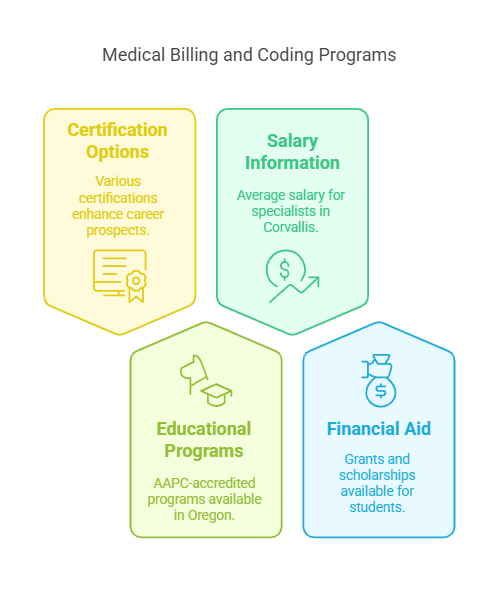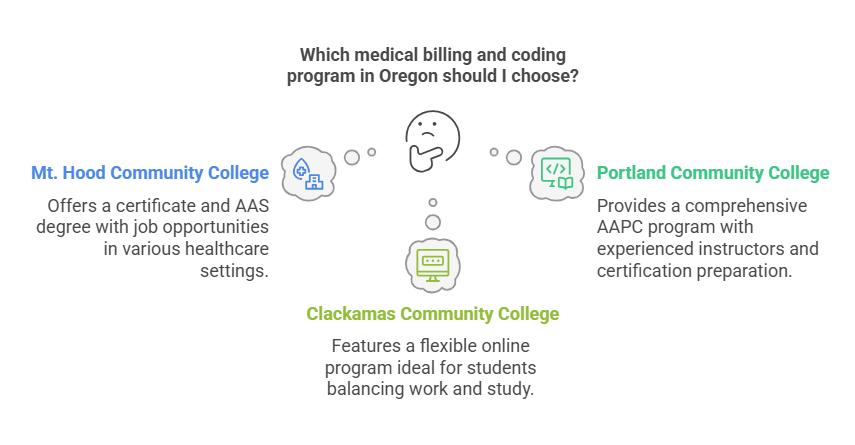Top Medical Billing and Coding Certification Oregon: Your Career Path Guide
Are you considering a career in medical billing and coding in Oregon? With the increasing reliance on electronic health records (EHR) and the growing demand for skilled professionals in the healthcare industry, now is a great time to enter this field. This guide provides an overview of certification programs, costs, prerequisites, job outlook, and training programs in health information management.
Why Choose Medical Billing and Coding in Oregon?
Medical billing and coding play a crucial role in healthcare administration by ensuring accurate patient records and proper insurance claim processing. Obtaining a medical billing and coding certification from a reputable organization, such as AMBCI, can enhance your career prospects. Oregon offers five AAPC-accredited medical billing and coding programs, providing quality education and a strong job market.
The demand for certified coders and billers is high due to the expansion of healthcare services. In Corvallis, the average annual salary for a medical records specialist is approximately $65,800 in 2025, with competitive wages across the state. Earning a recognized certification, such as the Certified Professional Coder (CPC) or Certified Billing and Coding Specialist (CBCS), enhances career prospects and salary potential.
Financial aid options, including grants and scholarships, are available to reduce educational costs, making certification programs accessible to a broader audience.
Top Medical Billing and Coding Certification Programs in Oregon
Several educational institutions in Oregon offer accredited medical billing and coding programs designed to prepare students for certification exams.
1. Mt. Hood Community College
Mt. Hood Community College provides a Medical Office: Billing and Coding Certificate, covering healthcare administration, coding systems, and insurance processing. Students can pursue an Associate of Applied Science (AAS) degree for advanced learning and better career opportunities. Graduates secure jobs in hospitals, clinics, and insurance companies.
2. Portland Community College (PCC)
PCC offers an AAPC Medical Coding Program, typically completed within 6–9 months. The program includes structured coursework, industry-standard coding systems, and preparation for national certification exams. Students benefit from experienced instructors and a comprehensive curriculum.
3. Clackamas Community College (CCC)
CCC provides a flexible online medical billing and coding program, ideal for students balancing work and studies. This online certification prepares students for the CPC and CPB (Certified Professional Biller) exams, offering a convenient pathway to certification.
Understanding Medical Billing and Coding Certification
Becoming certified in medical billing and coding requires completing an accredited program and passing a national certification exam. The Certified Professional Coder (CPC) is the most recognized credential, while other certifications like the Certified Coding Associate (CCA) or Certified Billing and Coding Specialist (CBCS) can enhance career prospects.
Certifications require a strong understanding of ICD-10, CPT, and HCPCS coding systems. Additionally, medical terminology, anatomy, and healthcare regulations are key components of training programs.
Job Outlook and Salary Expectations in Oregon (2025)
The job outlook for medical billing and coding specialists in Oregon is projected to grow by 8% through 2032, reflecting the expanding need for healthcare services. Approximately 15,000 new job openings are expected annually in the medical administration sector.
The average salary for medical coders in Oregon varies based on location and experience:
Entry-level coders: $42,000 per year
Experienced professionals: $55,000–$70,000 per year
Senior coders and auditors: Up to $85,000 per year
With additional certifications and specializations, medical coders can increase their earning potential.
Financial Aid and Scholarships for Certification Programs
Financial aid options, including federal grants, scholarships, and student loans, help students manage educational expenses. Some key funding sources include:
Pell Grants – Federal aid offering up to $7,000 per year in 2025.
State Grants – Oregon provides specific grants for healthcare students.
Scholarships – Many private organizations and colleges offer merit-based scholarships.
Students should apply for financial aid early through the FAFSA (Free Application for Federal Student Aid).
Preparing for the National Certification Exam
Preparing for the CPC or CPB exam requires dedicated study time, practice tests, and hands-on experience. Here are some tips for success:
Create a study schedule – Break content into manageable sections.
Take practice exams – Simulate real exam conditions to improve confidence.
Use official coding books – Mark key sections for quick reference.
Stay updated with coding changes – Medical coding guidelines are updated annually.
Exam day preparation includes time management strategies and stress-relief techniques to ensure peak performance.
Six Lesser-Known Facts About Medical Billing and Coding
Remote Work is Common – Many medical coders work from home, providing flexibility in career choices.
🔗 AHIMA: Remote Medical CodingMultiple Specializations Exist – Coders can specialize in fields like oncology, cardiology, and orthopedics, increasing earning potential.
Artificial Intelligence is Changing the Industry – AI-driven coding software is helping professionals speed up and improve coding accuracy.
🔗 Forbes: How AI is Transforming Medical CodingHealthcare Compliance is a Key Focus – Coding professionals ensure that hospitals comply with HIPAA regulations and avoid billing fraud.
Certification Maintenance is Required – Certified coders must complete continuing education credits (CEUs) to stay updated on industry changes.
Medical Coding Can Lead to Higher Roles – Many coders transition into healthcare management, auditing, or consulting roles over time.
Frequently Asked Questions (FAQs)
-
The Certified Professional Coder (CPC) and Certified Billing and Coding Specialist (CBCS) are widely recognized and highly valued in the industry.
-
Most programs take 6 to 12 months, depending on full-time or part-time enrollment.
-
Yes, many schools, including Clackamas Community College, offer online courses for flexibility.
-
Salaries range from $42,000 to $85,000, with experienced coders earning higher wages.
-
Oregon does not mandate state-specific certification, but national credentials like CPC or CPB improve job prospects.
Conclusion: Start Your Career in Medical Billing and Coding
Medical billing and coding is a lucrative and in-demand career in Oregon. With competitive salaries, flexible learning options, and strong job growth, now is the perfect time to get certified.
Explore accredited programs at Mt. Hood Community College, Portland Community College, and Clackamas Community College, and take advantage of financial aid options to kickstart your career.
Take the first step today and secure your future in the growing healthcare industry!




